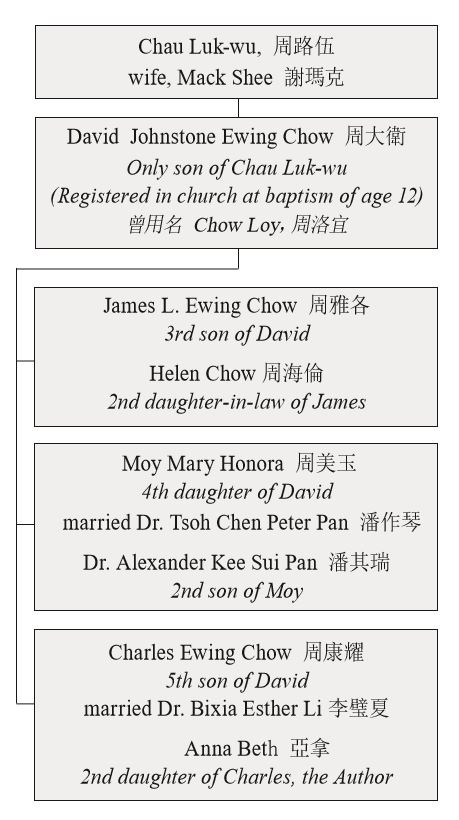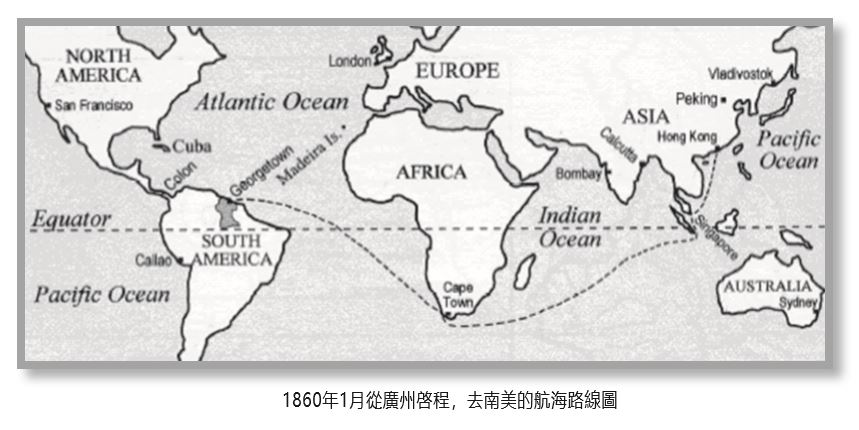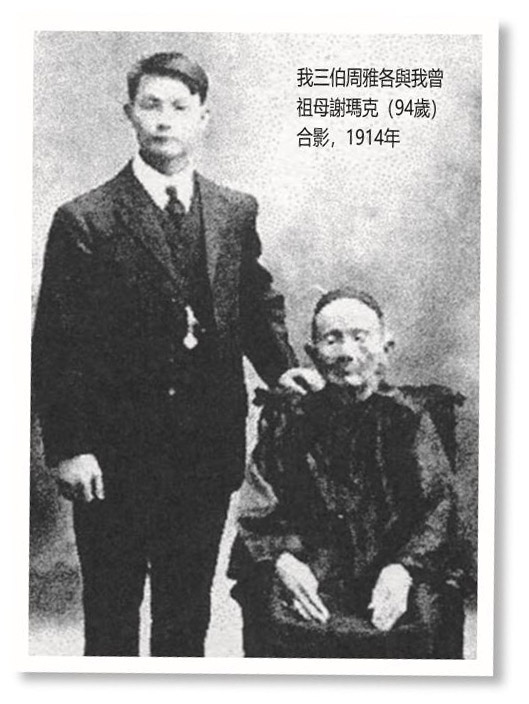Amazing Grace through Generations
Anna Beth
Initial Cause Tom, my son’s father-in-law, said earnestly, we ought to pass on our family heritage to my grand-daughter Amelia in writing. Her first birthday has drawn near. What is the proper gift for her? Her pure joy has stirred up my heart: In the coming ages God might show the immeasurable riches of his grace in kindness toward us in Christ Jesus.(Eph 2:7) Oh!Yes. I am to write for her “Amazing Grace through Generations: Stories of the Missionaries.” It should be in English and Chinese for the little girl to learn both as her mother wishes.
Outline The series is led by a synopsis, initially depicted by my 3rd uncle James, “David and His Children” about the family stories of my grandpa, David Johnstone Ewing Chow (周大衛, 1867-1923). Uncle James L. Chow (周雅各, 1894-1980) studied at the Christ College of Cambridge University and Gray’s Inn of Court. He was distinguished among the few who were qualified to stand and to plea, as the British Barrister at Law (Cantab. England, 1916). He joined Chinese Christian Student Federation, where he served in teaching at the east-end London. His writing on the Ewing-Chows was passed on to me by Dr. Alexander Kee Sui Pan (潘其瑞, 1932-2017), his grandson Alec, who stated, “This is the sole copy.” Alec’s father, my 4th Uncle –in-law Dr. Tsoh Chen Peter Pan (潘作琴, 1899-1959), served Her Majesty Queen Elizabeth as her personal physician. He also served the Lord. Alec’s mother was my 4th Aunt Moy (Mary Honora 周美玉, 1900-1987). The personalities of the family tree in the outline are shown below.

July of 1981 my family was invited to Canada by my cousin. When Alec passed on Uncle James’s typed manuscript, and said, “ This is the sole photo copy I made…… Under the influence of your father (Charles Ewing Chow 周康耀, 1904-1982) in my childhood, I obtained dual degrees of Medicine and Music for gospel to serve the Lord. This article describes the first missionary trip of the Chows from China to South America. For the awareness and benefit of those of us living in America, and the generations to come, it is being written in English and Chinese, extending hence from great grandpa to grandpa, from grandpa to my father with aunts and uncles, and from father to us and our children. The torch of the gospel has been and will be passed on from one generation to the next. God works wonders in every individual’s heart returning to Him and acknowledging Him, our Lord Jesus Christ as the personal savior and the Lord of our life; and, we follow His footsteps, according to His calling to each of us.
World Turbulence and Family Migration
In the middle of 19th century the world was in turbulence. The United Kingdom experienced social upheaval due to abolition of slavery. It caused a shortage of labourers in the plantations in British Guiana, where slaves were no longer sold. Therefore, the British government imported poor or destitute farmers by contract to come to South America as coolies or labourers in the plantation. At the same time, in China, an army of the Qing Dynasty Empire maneuvered to conquer the rebels sweeping through Southern China, fiercely suppressing the Taiping Rebellion, which was waged from 1850 to 1864, against Qing dynasty with estimated war deaths up to 70-100 million. Rebels in numerous towns and villages were wiped out. People were slaughtered, leaving piles of dead fighters and families. Some survivors hid beneath heaps of bodies, and after the army left, these survivors fled. Luckily those who survived this calamity heard of the potential immigrants signing contracts, heading to a new world across the ocean with the help of British people. They all rushed to Canton, thinking of how to escape from the slaughterhouse, and to cross the sea to the plantation working as coolies as the cost of paying for the voyage. With great uncertainty for their future, but needing to flee at any cost, they rushed to get on board to avoid the massacre. They could not wait to be there, where they would have food and lodging, and safety.
Visiting Immigrants Onboard, a Young Pastor Receiving A Calling
Now this is where my grandpa David’s father Chau Luk-wu (周路伍, died in1876) and the founder of the Chinese Baptist Church comes in. My great grandparents were missionaries by calling to ministry, but David’s mother Mack Shee (謝瑪克, 1820-1914) was also a doctor and acupuncturist.. She treated patients using herbal medicines, including dried specimens and seeds. It is extraordinary how my great grandparents became immigrants to British Guiana. The day before the ship was to sail, an American Baptist Pastor and Missionary, accompanied by a young keen Chinese Pastor Chau Luk-wu, my grandpa David’s father, went to see some of the immigrants congregating on the wharf. The young Pastor’s heart was stirred with pity and sighed, saying: “How sad it is to see this boat full of my countrymen going to a distant country with no one to minister to them.” The missionary turned to him, smiled, and said, “Why not go with them and take the gospel to them and others there?”
Pastor Chao Luk-wu Obeyed Calling to Oversea Mission
As soon as the young pastor Chao Luk-wu周路伍went home, he got on his knees and prayed, “Is it a call from you, Lord that I shall go?” He definitely felt that it was. He at once told his parents that he believed the Lord had asked him to go on the ship the next day to declare the “good news” and God’s plan of salvation through Jesus Christ, His Son. Whosoever believes in Him and confesses their sins before God, their sins little and big, they would be forgiven, for Jesus shed His blood on the Cross of Calvary, for the remission of the sins of the whole world-you and me. His parents, apparently Christians, made no attempt to stop him, but commended him into God’s keeping. He and his wife Mack Shee 謝瑪克said goodbye to his parents and family and went to the pier, just in time to get on board before the ship sailed away from the pier and headed for the sea.

The Voyage was Hard
The ship was named the Red Riding Hood (Red Riding Hood, see page 28 ) and set off January 22, 1860, sailing through Singapore, past the Cape of Good Hope, and arrived at Georgetown, British Guiana South America on April 8. The voyage was a long and tedious one, occupying 75 days, passing through the Strait of Malacca, across the Indian Ocean and the Atlantic Ocean (See bellow). The trip was very trying and painful for the Pastor. He was unlike the farmers and workers of the fields, was not accustomed to a “hard” life. However, with medicinal herbs from David’s mother, who was an herbalist and Chinese doctor, Chau Luk-wu was able to help many on the ship combat sea-sickness and other ailments. As a result, fewer died en route, compared with previous voyages to British Guiana.

Born in Chung-San, Guangdong province, Chau Luk-wu 周路伍, my grandpa David’s father was reported in the 1915 book by British governor, Sir Cecil Clementi (1875-1947). He had traveled with his wife Mack Shee 謝瑪克 on the Dora which landed in Georgetown on April 4th, 1860. Family memoirs show that Chau Luk-wu started working in Demerara and it is more likely that Chau and his wife were passengers aboard the Red Riding Hood which landed 5 days after the Dora.(My great grandma Mack Shee 謝瑪克 and her grandson, my 3rd Uncle James 周雅各, a photo of 1914, see bellow)

For Gospel A Young Pastor Was Made a Coolie
Georgetown, the capital of British Guiana, is near an island called, “The Devil’s Island,” where the French government sent political prisoners and hardened criminals to the end of their days. Very few were able to escape due to the sea being infested by sharks. Those who made it passed the sharks soon had to give themselves up to the authorities, as most were nearly dying from starvation. The Devil’s Island no longer exists as a prison, as it brought notoriety to the French government and people.
On arrival in Georgetown, on the Demerara River, the immigrant indentured laborers went to the various sugar and other plantations. Grandpa David’s parents Chau Luk-wu 周路伍, wife Mack Shee 謝瑪克were sent to the Sugar Plantation of Vries-Lust, about 7 miles from the City of Georgetown. On arrival, the Pastor Chau Luk-wu was sent to Peter’s Hall, near the sugar estate there. But he could not physically tolerate the labour of the cane field, and became ill.
Ministering Coolies Wholeheartedly
The overseers thought he was a malingerer who was pretending to be sick, but soon discovered that he was a refined and educated man as he used to write letters for the other Chinese labourers to be sent to their families in Canton. “See how God works!!”
Chau worked in the fields while his wife was later able to earn a bit extra as a herbalist and acupuncturist by providing medical services to the Chinese workers, although payment usually came in the form of garden vegetables, eggs and chickens.
He was then made a sort of teacher and advisor to the workers. That suited him because he was able to teach and preach to them about this Lord and Savior, Jesus Christ. In the course of time, he was able to convert quite a number. Through the help of his former pastor and the Baptist Church, he erected a church that seated about 120 people, as well as a house behind the church with about 4-5 rooms, a kitchen, and a large verandah, a half-sized safe parapet wall, and, the original enclosing wall of the old church.
Breaking New Territory for the Good News
The house was built on high greenheart-wood pillars and the wood of the house was of crab-wood which termites would not eat, because both greenheart and crabwood were very bitter. The church went on expanding in members and the workers on the estate saved enough money, to build another church and house across the Demerara River, almost opposite Peter’s Hall, as there were many Chinese workers at three of the largest estates there, so the converts there could work among them to accept the Lord. They therefore were able to build another church near the Canal Bridge, so that members from Peter’s Hall could take their boats to attend service and leave them at the Canal Bridge, and walk to the church about 200 yards distant.
They also put up a large building for the Elder or for whomever was sent there to conduct services to be able to stay there in the four large bedrooms. Adjoining the building was an enormous shed where meals were provided and where baptism services were held for converts. Converts were baptized in a deep pond at the back of the church. The rear of the church and baptismal pond was a long stretch of land with coconut and fruit trees, which was used for graves of deceased members of the church. This church was on the east bank of the Demerara River, whereas Peter’s Hall was on the west bank of the Demerara River.
Planting and Building Two Churches
At Peter’s Hall, the church ran a long way right up to the river. At low tide, the river would recede about 50 yards, so they built a bridge right up to the water at low tide so that baptisms could be held at either low tide or high tide.
Still later, another church was built on the west coast on land given by the Leonora Estate Company. The church was built by the side of the main road, which branched off to the left, on all the land from the bridge running several hundred yards up to the seashore. On that land, the members followed the same pattern of construction as at Peter’s Hall on the east bank. The church was named the Canal West Bank Church. The baptismal pond and main church, which could hold 150 people, were located at the front. Behind the church building was a house with 4 rooms to accommodate those to be baptized. Beyond these buildings was a large kitchen shed for cooking meals. Beside this shed, was Pastor’s building with 2 large bedrooms for the Pastor’s use, and another large room divided into two sections for the caretaker, and for those who wished to spend the night there.
Rested Untimely Leaving His Son to Carry On
Great grandpa worked in the field. So did his wife in the field, rescued the immigrants in emergency, with herbs and acupuncture for free, though she accepted chicken and eggs. She gave birth to a son at age 47 in the field. The boy Chow Loy 周洛宜 was my grandpa and his name was changed at baptism at age 12 by Pastor Ewing to:David Johnstone Ewing Chow. That was what David’s mother told him: After she gave birth to David, Mr. Ewing found her working in the field with her infant in a bag beside her. From then on, he got her work indoors.
Mr. Hoashoo, a rich merchant, acted as David did, and helped considerably to erect the church. Years later, when he died, he was buried at the church. “The two families of Hoashoo, and David Ewing Chow were closely related. Later, the Lows came. Not only had the Hoashoos, Chows, and Lows served the Lord and built the church together, but there were also multiple marriages among their children.
So far as can be ascertained, the previous English Pastor was never married as he thought only of the Lord’s work. Pastor Chau Luk-wu inhabited the English Pastor’s quarters, planted and shepherded two churches. Both he and his wife worked, died, and were buried there. Pastor Chau Luk-wu was an intellectual and scholar. He served the Lord and labored as a coolie in the plantation for years. The plantation work impacted his health and he passed away at an untimely age, when his son was only nine years of age. In approximately 1876, Chau fell ill and died a year later, leaving a daughter aged 12 and a son, Chow Loy, aged 9. His son, my grandpa David, grew up, being chosen and used by the Lord.